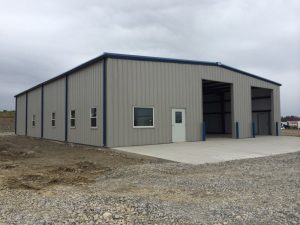What Is The Best Foundation For a Metal Building?

What Is The Best Foundation For a Metal Building?
When building a metal structure, one of the most critical aspects is ensuring it has a solid and stable foundation.
Metal buildings, being large and often heavy structures, demand a foundation that is not only strong but also
tailored to the specific requirements of the building, the location, and the intended use. The type of foundation
you choose will directly impact the building's long-term performance, stability, and maintenance.
There are various foundation systems available, each suited for different types of soil, climates, and building purposes.
Understanding which foundation works best for your specific metal building is essential to avoiding issues such as settling,
cracking, or shifting floors. At Champion Buildings, Inc., we specialize in designing and erecting metal buildings and
understand the importance of the right foundation for your structure.
This article will discuss the most common types of foundations used for metal buildings and explain why a concrete slab is often the best choice.
The Importance of Metal Building Foundations
A metal building foundation plays a pivotal role in supporting the overall structure and ensuring its durability.
Without a solid foundation, metal buildings can suffer from misalignment, shifting walls, and uneven floors,
which can lead to dangerous structural failures or the need for costly repairs. Over time, inadequate
foundations may cause the building to settle or shift, further complicating the situation.
In some cases, the damage caused by a poorly constructed foundation may be so severe that it becomes more
cost-effective to demolish and rebuild the structure rather than attempt to repair the foundation.
This emphasizes the importance of choosing the right foundation from the very beginning.
Pre-engineered metal buildings often require foundations that are more complex and tailored than those for conventional buildings.
For this reason, it’s essential to work with a licensed structural engineer who has experience designing foundations for steel buildings.
Basic Types of Foundations for Metal Buildings
There are three main foundation systems commonly used for pre-engineered metal buildings:
Slab Foundation
Pier and Beam Foundation
Perimeter Footing/Foundation
Slab Foundation
The slab foundation is the most popular choice for metal buildings.
This concrete slab not only forms the floor of the building but also supports the steel framing of the structure.
Concrete slabs are poured directly on the ground and are usually reinforced with steel rebar to ensure they are strong enough to withstand the building’s weight and any additional loads, such as equipment or vehicles inside the building.
Concrete slab foundations are ideal for buildings where a stable, solid base is required, and they are particularly effective in areas where soil conditions are stable.
Slabs also provide a smooth, clean surface for the installation of flooring or equipment and minimize the risk of pests or moisture penetration, which can sometimes be a concern with other foundation types.
Pier and Beam Foundation
For certain types of metal buildings, especially those that require a dirt or gravel floor, a pier and beam foundation is used.
This foundation is commonly seen in agricultural buildings, such as livestock barns, as well as open-air structures like pavilions or riding arenas.
The piers lift the building off the ground, providing a space between the structure and the soil.
In areas with unstable soils or high water tables, pier and beam foundations are beneficial because they prevent direct contact between the structure and the ground,
reducing the risks associated with moisture or soil shifts.
Concrete piers are poured deep into the ground, with one pier supporting each column of the steel frame.
These piers are then tied together below the surface to provide stability.
Advantages of pier and beam foundations include:
Fewer materials and labor are needed, making them more affordable.
No extensive excavation is required.
They are easier to inspect and maintain over time.
Perimeter Footing/Foundation
A perimeter footing or perimeter wall foundation is another common option for metal buildings.
This type of foundation involves pouring concrete around the perimeter of the structure to support the outer walls of the building.
Perimeter footings are particularly effective for buildings with larger footprints and provide strong support to the external framing and walls.
Perimeter foundations are often used in combination with slab foundations to enhance the overall stability of the building, particularly in
locations where the ground beneath the building may not be uniform in its ability to support weight.
The combined use of slab and perimeter foundations offers better overall load distribution and structural integrity.
Choosing a Steel Building Foundation
Several factors will influence the type of foundation best suited for your metal building. These include:
Soil Type: The composition of the soil on your site will greatly impact the stability of the foundation. For example, clay soils can expand or shrink with moisture, whereas sandy soils may be less stable.
Local Frost Lines: The depth to which the ground freezes in winter can affect the foundation design, particularly in colder climates.
Building Weight: The overall weight of the building, including any equipment or vehicles inside, will influence the type of foundation required to support the structure adequately.
Building Dimensions: Larger buildings require more extensive foundations to ensure they remain stable and level over time.
Building Reactions: The way the building reacts to wind, snow, or seismic forces should be considered when designing the foundation.
Anchor Bolt Location: The location of the anchor bolts used to attach the steel framing columns to the foundation must be factored into the design.
Why Concrete Slab Foundations Are the Best for Metal Buildings
Concrete slab foundations are generally considered the best option for most metal buildings, and here's why:
Stability: Concrete is a stable and reliable material that provides a solid base for steel buildings.
It resists movement, cracking, or settling over time, ensuring the structure remains level and secure.
Cost-Effective: While not the cheapest option initially, concrete slabs are often more affordable in the long run because they require less maintenance and repair compared to other foundation types.
Durability: Concrete is incredibly durable, capable of withstanding heavy loads and environmental stresses without deteriorating.
Slab foundations also offer resistance to mold, mildew, and pests, all of which can cause issues in other foundation systems.
Ease of Construction: Concrete slab foundations are relatively quick to install, reducing the overall time and cost of construction.
Versatility: Whether you are building a simple workshop or a large commercial facility, a concrete slab foundation provides the versatility needed for any size or type of metal building.
Prevention of Moisture Issues: Concrete slab foundations can help prevent moisture from rising from the ground into the building, which is particularly important in areas with high humidity or high water tables.
For standard metal buildings, the concrete slab should be at least four inches deep.
For buildings used to store heavy equipment or vehicles, the slab should be between five and six inches deep to ensure it can support the additional weight.
Key Points to Remember
Soil Analysis: Always have the soil analyzed before beginning construction. If necessary, bring in higher quality fill to improve soil conditions.
Structural Engineer: Hire a licensed structural engineer to design the foundation. This is not an area where you want to cut corners, as poor foundation design can lead to costly repairs or even the complete failure of the building.
Foundation Design: The design of your foundation should be tailored to your building's specific needs, including size, location, and intended use.
A structural engineer will take into account factors such as snow and wind load to ensure the foundation can withstand all environmental stresses.
Conclusion
When constructing a metal building, the foundation you choose is critical to ensuring the structure’s stability, longevity, and performance.
While there are several foundation options available, the concrete slab is often the best choice due to its strength, affordability, and durability.
However, it’s essential to consider factors such as soil conditions, building weight, and location to determine which foundation type is ideal for your project.
At Champion Buildings, Inc., we specialize in designing and constructing metal buildings with the proper foundations to meet your needs.
Our team of experts will guide you through every step of the process, ensuring that your building is both safe and long-lasting.
If you're ready to start your next metal building project, contact us today for personalized advice and professional foundation services.





